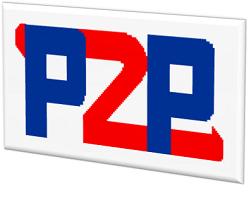 No, not B2B or B2C, but P2P – person to person – the way in which real people communicate with each other.
No, not B2B or B2C, but P2P – person to person – the way in which real people communicate with each other.
We all know how to do this, and in fact, most of us do this pretty well each and every day of our lives.
How come we seem to forget about basic, direct, personal communication when the mic opens at most radio stations? Or when we logon to the station’s Facebook page?
It’s because most of us were trained for broadcasting – not necessarily communicating or interacting in a personal way.
When you think about the dictionary definition of broadcasting, it often encompasses “disseminating over the air programming to a mass, undifferentiated audience.”
And while Facebook and other social media platforms provide us with the ability to reach large numbers of people in their communities, that’s not why most folks signed up in the first place. If you think about the underpinnings of social media, it is to connect, to interact, to share, and to get personal with friends and family members. And that defines why Facebook has become a societal phenomenon.
Yet when radio tries to make a go of having a presence on Facebook, it often reverts to that comfortable old couch known as “mass communication,” even though that style often makes the medium come off as tone deaf in a sea of sharing, caring, lurking, and interacting.
I was in a meeting the other day with a group of broadcasters working hard to bridge these gaps, and develop an effective means of integrating social media into their communication menu.
And as the conversation unfolded, it was not difficult to see how radio people have to work around their lifelong learning in order to be effective at connecting via Facebook. It reminded me of the video “The Morning Guy” that made the rounds a few years ago, parodying an annoying morning DJ.
>EMAIL RECIPIENTS: CLICK HERE TO VIEW THE MORNING GUY VIDEO<
Watch it again or for the first time here to remind yourself about how the ways most radio people learned to talk to listeners work against us when we attempt to tap into Facebook and other social platforms.
That’s because so many Facebook posts on branded radio “like” pages come off with that same lack of warmth or understanding of what people want and why they are there in the first place. Too often, radio’s Facebook communiqués shout at consumers, “broadcasting” what’s important to the station, while rarely reaching out to people in ways that pull in, rather than repel.
 Back to that aforementioned meeting, and KKDO/Entercom Sacramento Promotions Director, Melissa Maxwell, reminded the room of the importance of acting like a magnet when using social media – drawing people in – rather than acting like a megaphone and loudly talking at them.
Back to that aforementioned meeting, and KKDO/Entercom Sacramento Promotions Director, Melissa Maxwell, reminded the room of the importance of acting like a magnet when using social media – drawing people in – rather than acting like a megaphone and loudly talking at them.
In a nutshell, isn’t this the problem – and the opportunity for radio on Facebook? It’s learning communication skills all over again. Just as there’s a different style of connecting with people on Facebook versus Twitter, there’s an ocean of difference between effective communication with consumers on social media versus our traditional broadcast air sound.
Magnets and megaphones.
P2P.
We need to stop shouting at them, and instead, attract them with personal, effective, empathetic content they care about.
We have a lot to learn.
- A 2020 Lesson?It Could All Be Gone In A Flash - April 24, 2025
- How AI Can Give Radio Personalities More…PERSONALITY - April 23, 2025
- Can Radio Afford To Miss The Short Videos Boat? - April 22, 2025




Great stuff Fred! We do have so much to learn and it’s difficult to know where to start. Here’s one recommendation…anyone looking to understand or to just start the learning process about Internet tools should begin with Dan Zarrella’s “Hierarchy of Contagiousness”…(now only $1.99 in Kindle). Easy read with excellent insights based on lots of survey data and examples.
Thanks for the tip, Mike. Will check out Dan’s writing. Thanks again for reading the blog and contributing.
Hi Fred,
I’m not sure that the issue is that we were trained for ‘broadcasting’. The best radio was always a magnet even when ‘broadcast’. You wanted to hear what the person said. Think Howard Stern.
The worst radio – and there is so much these days – talks about itself endlessly in clichéd slogans while running ads that scream at the listener – for car dealers or debt relief. Is it any surprise that their Facebook pages scream at the listener in clichéd writing?
John, thanks for these prescient thoughts about the state of the union. There is a lot of mediocrity out there but the best broadcasters intuitively know how to connect. On Facebook, too. Appreciate you adding your comments as always.